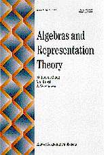
ALGEBRAS AND REPRESENTATION THEORY
Scope & Guideline
Exploring the Depths of Mathematical Innovation
Introduction
Aims and Scopes
- Representation Theory of Algebras:
The journal extensively covers representation theory, delving into the structures and classifications of modules over various types of algebras, including finite-dimensional algebras, Hopf algebras, and quantum groups. - Homological Algebra and Cohomology:
Homological techniques and cohomological methods are frequently employed to study algebraic structures, with a focus on derived categories, projective resolutions, and the interplay between homological properties and representation types. - Quantum Groups and Algebras:
A significant portion of the research revolves around quantum groups and their representations, exploring the algebraic structures arising from quantum theory and their applications in both mathematics and theoretical physics. - Categorical Perspectives in Algebra:
The journal features works that utilize categorical frameworks to study algebraic concepts, including derived categories, triangulated categories, and various types of functors that reveal deep insights into the nature of algebraic objects. - Geometric and Combinatorial Aspects:
Research often intersects with geometric and combinatorial aspects of algebra, examining how geometric structures relate to algebraic representations and how combinatorial techniques can be applied to solve algebraic problems.
Trending and Emerging
- Higher Dimensional Algebras:
There is a growing trend towards exploring higher-dimensional algebraic structures, such as 2-categories and higher categories, reflecting a broader interest in categorification and its implications for representation theory. - Quantum and Affine Algebras:
Research on quantum and affine algebras is increasingly prevalent, showcasing their relevance not only in mathematical theory but also in physics, particularly in areas like quantum field theory and string theory. - Homotopical and Derived Algebraic Geometry:
Emerging interest in homotopical methods and derived algebraic geometry signifies a shift towards integrating topology with representation theory, allowing for new insights into classical problems. - Categorification and Representation Stability:
The themes of categorification and representation stability are gaining traction, as researchers investigate how these concepts can provide deeper understanding and connections between various algebraic structures. - Interactions with Combinatorial Algebra:
Increased attention is being paid to the combinatorial aspects of representation theory, particularly in how combinatorial techniques can be utilized to solve algebraic problems and derive new results.
Declining or Waning
- Classical Representation Theory:
There is a noticeable decline in classical topics related to finite group representations, particularly those that do not incorporate modern techniques or connections to quantum groups and categories. - Basic Algebraic Structures:
Fundamental studies on basic algebraic structures, such as commutative rings and their representations, have become less frequent, possibly overshadowed by more complex and nuanced explorations of non-commutative algebras. - Fixed-Point Theorems in Representation Theory:
Research focusing specifically on fixed-point theorems and their applications in representation theory has decreased, indicating a potential shift towards more dynamic and variable approaches in the field.
Similar Journals
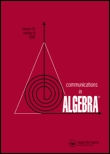
COMMUNICATIONS IN ALGEBRA
Pioneering Discoveries in Algebraic Research.COMMUNICATIONS IN ALGEBRA is a prestigious academic journal dedicated to advancing the field of algebra and number theory. Published by Taylor & Francis Inc, this influential journal has been in circulation since its inception in 1974 and continues to provide a platform for innovative research through 2024. With an ISSN of 0092-7872 and an E-ISSN of 1532-4125, it serves a global community of researchers, professionals, and students who are passionate about algebraic studies. The journal is currently ranked in the Q2 category in Algebra and Number Theory for 2023, showcasing its strong impact and relevance within the academic community, as reflected in its Scopus rank of #60 out of 119 and a 50th percentile standing. COMMUNICATIONS IN ALGEBRA aims to publish high-quality, peer-reviewed research articles that not only address current issues in the field but also pave the way for future exploration, solidifying its role as a cornerstone of mathematical literature.
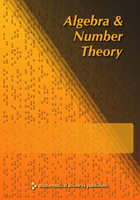
Algebra & Number Theory
Advancing the Frontiers of Algebra and Number TheoryAlgebra & Number Theory, published by Mathematical Science Publications, stands at the forefront of mathematical research, particularly in the fields of algebra and number theory. With an ISSN of 1937-0652 and E-ISSN 1944-7833, this esteemed journal provides a dedicated platform for the dissemination of cutting-edge theoretical advances and practical applications. It has achieved a Q1 category ranking in both algebra and number theory according to the 2023 quartiles, reinforcing its critical role in shaping contemporary mathematical discourse. The journal serves as an essential resource for researchers, professionals, and students alike, offering insights into diverse mathematical methodologies and fostering open dialogue among scholars. Although it does not provide open access, its robust impact factor reflects the high quality and relevance of its published work. Based in the United States at the University of California, Berkeley, the journal's commitment to excellence continues to attract contributions that push the boundaries of mathematical understanding.

Algebraic Geometry
Charting New Territories in Algebra and GeometryAlgebraic Geometry, published by the European Mathematical Society, stands as a pivotal platform in the realm of modern mathematics, focusing on the intricate interplay between algebra and geometry. Since its inception in 2014, this Open Access journal has garnered significant attention, reflected in its prestigious rankings, including Q1 status in the categories of Algebra and Number Theory and Geometry and Topology, as per the 2023 metrics. With an impressive Scopus ranking of #18/119 in Algebra and Number Theory and #18/106 in Geometry and Topology, it ensures high visibility and accessibility of groundbreaking research. Based in Germany, at the esteemed Technical University of Berlin, the journal serves as a beacon for researchers, professionals, and students aiming to push the boundaries of knowledge in these dynamic fields. The scope of the journal encompasses diverse topics, including but not limited to, the latest developments in algebraic structures and geometric configurations, promising to enrich the academic discourse and foster innovation. As we converge towards its tenth anniversary in 2024, Algebraic Geometry continues to evolve and solidify its role as an essential resource for the mathematical community.

MICHIGAN MATHEMATICAL JOURNAL
Exploring the Depths of Mathematical Theory and ApplicationThe MICHIGAN MATHEMATICAL JOURNAL is a prestigious and influential publication in the field of mathematics, founded by the University of Michigan. With an ISSN of 0026-2285 and an E-ISSN of 1945-2365, this journal is recognized for its high-quality research and has achieved a commendable Q1 ranking in the category of Mathematics (miscellaneous) as of 2023. Published by the esteemed Michigan Mathematical Journal, it provides a platform for the dissemination of innovative mathematical theories and findings, playing a crucial role in advancing knowledge and scholarship within the mathematical community. With coverage spanning from 1996 to 2024, the journal emphasizes rigorous theoretical development and fosters collaboration among researchers, professionals, and students alike. While not an open-access journal, its contributions are invaluable for those looking to stay abreast of cutting-edge mathematical research.
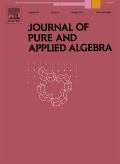
JOURNAL OF PURE AND APPLIED ALGEBRA
Innovating Algebra: Where Theory Meets ApplicationJOURNAL OF PURE AND APPLIED ALGEBRA, published by Elsevier, stands as a premier academic platform in the fields of algebra and number theory, boasting a distinguished impact factor that reflects its rigorous peer-review process and influential research contributions. Established in 1971 and continuing its impressive trajectory until 2025, this journal has carved a niche for itself by providing a forum for innovative studies, theoretical advancements, and practical applications within pure and applied algebra. With its prestigious Q1 ranking in Algebra and Number Theory, the journal not only ranks among the top tier in its category but also offers an extensive collection of research that caters to mathematicians, academicians, and students alike. Scholars will find it an invaluable resource for disseminating their findings, as well as keeping abreast of significant developments in the field, further solidifying its role as a cornerstone of mathematical research.

Journal of Combinatorial Algebra
Innovative Insights in Combinatorial AlgebraThe Journal of Combinatorial Algebra, published by the European Mathematical Society (EMS), is a pioneering open-access journal dedicated to advancing research in the fields of Algebra and Number Theory, as well as Discrete Mathematics and Combinatorics. Since its inception in 2018, the journal has been committed to promoting high-quality, rigorous research, evidenced by its 2023 scopus rankings placing it in the second quartile across both disciplines. It serves as a vital platform for academics, researchers, and students to share innovative findings, methodologies, and theoretical advancements within combinatorial algebra, facilitating collaboration and knowledge dissemination in the mathematical community. With its open access policy adopted in 2021, the journal ensures that its content is freely available to a global audience, further enriching the landscape of mathematical research. The journal's editorial board, composed of leading experts, guarantees the integrity and academic excellence of published articles, making it an essential resource for those engaged in the dynamic fields of combinatorics and algebra.
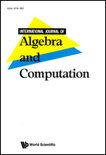
INTERNATIONAL JOURNAL OF ALGEBRA AND COMPUTATION
Bridging Theory and Application in Algebraic ComputationThe INTERNATIONAL JOURNAL OF ALGEBRA AND COMPUTATION, published by WORLD SCIENTIFIC PUBL CO PTE LTD, is a prominent platform in the field of mathematics, specifically focusing on algebraic structures and computational methods. With a publication history dating back to 1996 and converging to 2024, this journal has established a significant presence within the academic community, as reflected in its Q2 category ranking in Mathematics and its position in the Scopus 45th percentile for General Mathematics. Although it does not offer Open Access, researchers can access a wealth of original research articles, comprehensive reviews, and groundbreaking findings that contribute to the advancement of mathematical theory and its applications. This journal not only serves as an invaluable resource for mathematicians but also encourages interdisciplinary research by appealing to professionals and students alike who seek to deepen their understanding of algebra and computation methodologies.

TRANSFORMATION GROUPS
Advancing Knowledge through Innovative Mathematical TransformationsTRANSFORMATION GROUPS, published by Springer Birkhäuser, is a leading academic journal specializing in the fields of algebra, geometry, and topology. With its ISSN 1083-4362 and E-ISSN 1531-586X, the journal has established itself as an essential resource for researchers and academicians, achieving a remarkable Impact Factor and ranking in prestigious categories: Q1 in Algebra and Number Theory and Q2 in Geometry and Topology as of 2023. Over its history from 1997 to 2024, TRANSFORMATION GROUPS has delivered cutting-edge research and innovative insights, currently holding Scopus rankings of #40/119 in Algebra and Number Theory and #38/106 in Geometry and Topology. This journal caters to those seeking to enhance their understanding of mathematical transformations and their applications, making it a vital platform for scholarly discourse within the mathematical community.
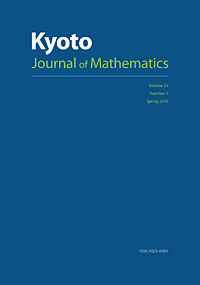
Kyoto Journal of Mathematics
Unleashing potential through cutting-edge mathematical research.Kyoto Journal of Mathematics is a premier academic publication dedicated to advancing the field of mathematics, published by DUKE UNIVERSITY PRESS. Established in 1996, this journal serves as a vital platform for sharing innovative research and breakthrough studies across various mathematical disciplines. The journal has consistently maintained a prestigious Q1 ranking in the category of Mathematics (miscellaneous) as of 2023, reflecting its significant impact and contribution to the mathematical community. With its Open Access policy, the Kyoto Journal of Mathematics ensures that groundbreaking research is easily accessible to a global audience, fostering collaboration and knowledge dissemination among researchers, professionals, and students alike. The journal's commitment to excellence and relevance in mathematical research is underscored by its extensive archive of published works and its continuous engagement with contemporary mathematical challenges. This makes the journal an essential resource for anyone seeking to stay abreast of current trends and advancements in the field.
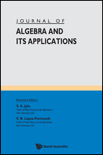
JOURNAL OF ALGEBRA AND ITS APPLICATIONS
Advancing Mathematical Knowledge Through Rigorous ResearchJOURNAL OF ALGEBRA AND ITS APPLICATIONS, published by WORLD SCIENTIFIC PUBL CO PTE LTD, stands as a pivotal resource for scholars in the fields of Algebra and Applied Mathematics. With an ISSN of 0219-4988 and E-ISSN 1793-6829, this journal has been providing a forum for the dissemination of cutting-edge research since its inception in 2008, converging towards a forward-looking timeline extending to 2024. As of 2023, it has earned a commendable Q2 ranking in both Algebra and Number Theory, as well as Applied Mathematics, reflecting its solid impact within the mathematical community. With a Scopus rank of #49/119 in Algebra and Number Theory, and #420/635 in Applied Mathematics, the journal captures significant advancements and applications across various mathematical domains. While it does not operate under an open access model, its comprehensive articles and research outputs are crucial for fostering intellectual dialogue and innovation in academia. Researchers, professionals, and students alike will find this journal an indispensable asset for their scientific pursuits and explorations into the vast field of mathematics.